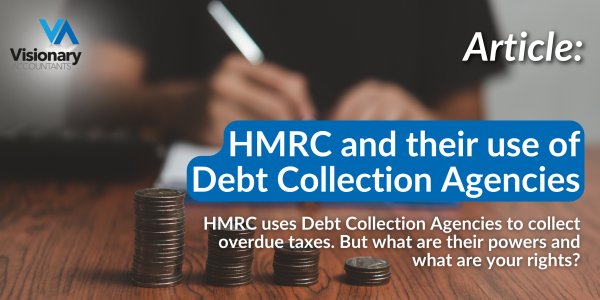A recent theme of the news article from our accountants has been advising you about scams and the possibility of being contacted by someone who is not authorised to contact you. Therefore, it is sensible to continue this topic and advise about HMRC’s use of debt collection agencies.
HMRC has debt enforcement powers for them to collect outstanding tax liabilities. These are wide-ranging and range from agreeing Time to Pay arrangements (see our earlier article Time to Pay Self-Service for PAYE and VAT) to deploying debt collection agencies as a ‘last resort’.
What is the process?
In August 2024, HMRC updated its ‘What will happen if you do not pay your tax bill’ guidance regarding what to do if you wish to make a complaint about a debt collection agency. This is important; however, it is the content of the guidance that is important.
There are options to avoid HMRC using its debt enforcement powers and always involve:
- Contacting HMRC (if you cannot pay the tax owed or there is a disagreement over the liability)
- Talking to HMRC in order to come to an agreement
If you do not engage with HMRC or refuse to pay what is owed, this may be last resort time and it is important you are aware of the debt collection agencies that are used and how they will make contact.
Who are these Debt Collection Agents?
At the time of writing, these are the debt collection agencies who may contact you:
- 1st Locate — trading as LCS
- Advantis Credit Ltd
- Ardent Credit Services —trading as Debt & Revenue Services (DRS)
- Bluestone Consumer Finance Limited — trading as Bluestone Credit Management
- BPO Collections Ltd
- CCS Collect — also known as Commercial Collection Services Ltd
- Moorcroft Debt Recovery Ltd
- Pastdue Credit Solutions Limited
How will they contact you?
The above debt collection agencies will only contact you by:
- Letter
- SMS text message, or
- Telephone
Debt collection agencies will never visit you at your home or place of work.
If the last resort comes, the message, therefore, is to be aware of the debt collection agencies that HMRC use and they way in which they will make contact. Any contact outside of this public information could be an attempt to fraudulently obtain monies from you or your business. Also be aware that HMRC have further debt collection powers if the debt is returned to them from a debt collection agency
Be aware, be vigilant and be careful. And note that the last resort isn’t really the last resort at all!
Further advice can be found at the links below but it is always advisable to speak to your accountant as soon as possible and preferably before problems arise. Here at Visionary Accountants we ensure our clients know their tax liabilities and when they are due well in advance to avoid falling foul of HMRC.
Payment problems re Self-Assessment, VAT, Employer’s PAYE or Corporation Tax (Gov.UK)
Time to Pay arrangements (Gov.UK guidance)
What our tax debt enforcement powers are and when we use them (Gov.UK)
